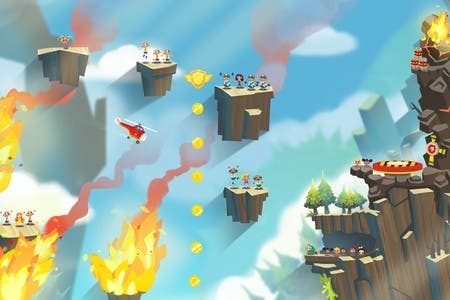The long way round: the story of one of the UK's most enduring studios
Denki's Gary Penn and Sean Taylor on working outside the mainstream and life after Quarrel.
It's a familiar enough story. A small group of idealistic developers jumps off the A-list hamster wheel and sets up on their own, eager to get away from the big budget grind. They want to make smaller games, they want to experiment and they want to use exciting new mainstream platforms to reach a wider audience.
The difference with this story is that for once it's not from some bright-eyed 2012 start-up, but from 12 years ago. That was when, in 2000, four people walked away from Grand Theft Auto developer DMA Design just as it was morphing into Rockstar, and started carving their own unique and somewhat circuitous route to success as Denki, the headstrong indie studio that last year finally broke big with the Bafta-nominated Quarrel. Not that those involved had any reservations about walking away from a studio that was about to go supernova thanks to GTA 3.
"We'd been through the mill with all the stuff at DMA," says Gary Penn, Denki's creative director and a man still best known for his time on legendary games magazines like Zzap 64 and The One. He'd moved from journalism into development, but found the bloated scale of console games design wasn't to his taste. "Some of us had spent four or five years on some titles," he explains. "There was this whiff of a digital revolution around the corner. Rockstar was moving towards bigger stuff, and while that's tremendously exciting and they were well positioned to do it, we didn't want that any more. We wanted to be faster and smaller."
"We'd been through the mill with all the stuff at DMA. There was this whiff of a digital revolution around the corner. Rockstar was moving towards bigger stuff, and while that's tremendously exciting and they were well positioned to do it, we didn't want that any more." Gary Penn
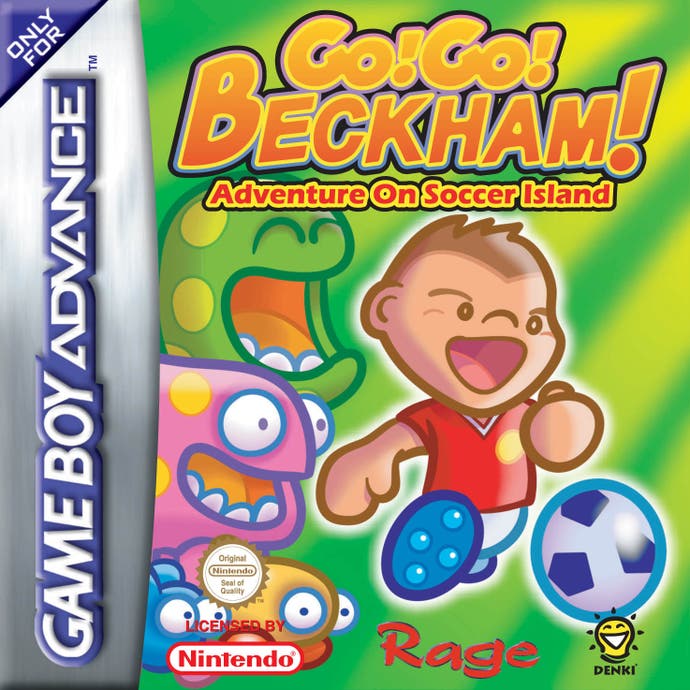
So it came to pass that as the rest of the games industry was cooing over the power of the PlayStation 2 and the birth of the modern blockbuster, the Denki team was focussing on the rather more dainty Game Boy Advance. The self-titled puzzle game Denki Blocks and the fantastically named Go! Go! Beckham! Adventure on Soccer Island set things rolling, but after Denki Blocks proved a hit on Sky's fledgling Gamestar platform the company found itself pulled in an unlikely direction.
"We were in there very early with the stuff we were doing for Sky", Penn says of the titles Denki was soon turning out for TV viewers to play on their remote control. It was casual gaming, but nobody had given it a name yet. For Gary, the distinction was simple. "You're dealing with an audience that doesn't treat gaming as the be all and end all of entertainment, which is what hardcore means. I know, I used to be a hardcore gamer. It was more than just a f**king hobby, it was a lifestyle. I think it was a really good slap in the face for the industry when the so-called 'casual' market took off. It reminds you that it's not just this isolated large niche. A broader public demand can be fulfilled here."
While other developers would have turned their noses up at such crude technology and fickle audiences, the perversity of it appealed to the Denki mindset. "One of the minor things we were interested in doing when we formed Denki was working on different platforms, the weird platforms, the platforms that were perceived as shit", Gary laughs. "That was far more interesting and these new audiences, potentially, were there."
Over the next eight years, Denki set a pace that would leave most rival developers reeling. Almost two hundred games poured out of their Dundee headquarters, developed for Sky and the US DirecTV service. Think of a popular character, cartoon or movie and chances are that Denki produced a simple and cheerful TV game to take advantage of it. Though these games barely registered on most gamer's radars, and would likely have been sniffily dismissed if they had, the experience of satisfying license holders, players and broadcasters with several games a month, all of which had to work on multiple set top box builds with constantly changing firmware, proved a great way to build Denki's core strengths.
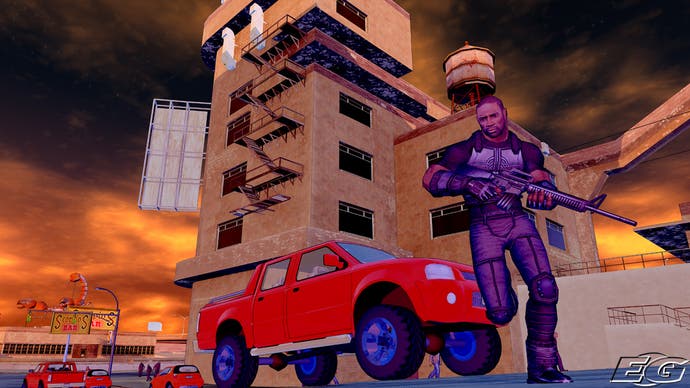
"It was really liberating, actually," says Sean Taylor, a Denki producer who joined the company at the height of its TV game turnover. "I'd been producing stuff for years, but this felt like the first time I'd had a real chance to hone my craft. Teach yourself some discipline, learn some rules and really just get better at making and shipping things. Something a lot of people overlook is that muscle building which is so critical in building your skill or your specialism. That, to me, was great. Valuable lessons, and we still use many of them today."
Being so far off the industry radar during the ascent of the hardcore gamer only strengthened Denki's indie spirit. "We were feeling slightly different anyway," Gary confesses. "We were keen to do stuff that had broader reach, and could be played by aunts and uncles and people like that. Sky coming along facilitated that, and made it more centre stage than perhaps we initially intended. That definitely compounded the sense of isolation."
However, as the decade rolled past it became clear that Sky's TV game audience wasn't growing as robustly as the developer had hoped. At the same time, with the emergence of smartphones and broadband internet and the success of the Wii, it was equally clear that the sort of games Denki had set out to make in 2000 were finally reaching maturity. "We were evolving, in terms of our passions and ideas, faster than the platforms themselves", says Sean. "It made sense to refocus back to more traditional distribution."
"We were evolving, in terms of our passions and ideas, faster than the platforms themselves." Sean Taylor
"We wanted to get back to more original stuff," Gary adds, explaining the decision to break back into the mainstream of the games industry, "But also we could see the landscape moving more towards the stuff we wanted when we started Denki. This would have been pre-iPhone. You had PopCap coming along, all these other portals emerging, the rise of the so-called casual gamer, and we thought, well, it's about f**king time."
The company split in two, with one team working to prototype new ideas, while the other continued doing work for hire to pay the bills. Eventually, six pilot ideas for Denki's rebirth were developed and play-tested.
"We picked what we thought was the best possible deal for taking those forwards, because we wanted to maintain a degree of control over the creative process and how this stuff was put out there," says Gary of Denki's first faltering steps back into the industry glare. "As it turned out, that didn't work out quite so well, with Quarrel for example."
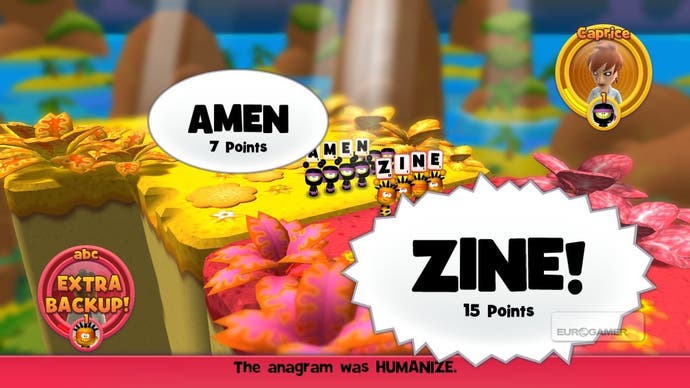
Aah, Quarrel. The brilliant word-puzzle-strategy hybrid that spent two years in development, then sat on the shelf for two years waiting for a publisher. "Getting this game launched wasn't exactly a smooth ride for us," managing director Colin Anderson said in an impassioned blog post back in January. "To give you some idea of how not smooth let's just say it was rejected by almost every games publisher in the world. Sometimes twice; occasionally three times."
The game was eventually picked up by UTV Ignition, and released on Xbox Live Arcade as intended, but the frustrations of the process, and of having to cede so much control to outside forces, made for a bumpy reintroduction to the industry of 2012.
"It's an awkward one," Gary muses diplomatically as he considers the aftermath of the launch. "The situation with UTV, as a company it went through I think three or four significant changes between us signing up and them being absorbed more fully into the Disney fold. Those sort of things don't help."
"The frustration is that you still can't self publish on Xbox Live Arcade," adds Sean. "We already knew this, but we're just not the sort of people who can afford to delegate too much responsibility. We don't have a bad word to say about anyone [at UTV]. We enjoyed our dealings with everyone there. It's more, I guess, it became clear quite quickly that we were more evolved in our digital distribution thinking than they perhaps were. It was slightly mismatched. But they got it out there, which we'll always be eternally grateful for."
It's perhaps no surprise that a company which has made a virtue out of taking the path less trodden plans to keep finding new outlets for its titles. "There's a certain perverse joy to be had targeting platforms that most people wouldn't," Gary says. "It's really just about getting stuff out there, forming a relationship with people on the other side of the fence. Trying to remove the fence. Any platform is fair game, it's just some of them have gatekeepers and you don't want to spend all your time arseing around with too much bullshit when you're trying to forge a relationship with the player."
"I guarantee that in the future we won't even regard play as a childlike pursuit. We'll take it as seriously as any other means of expression or escapism." Gary Penn
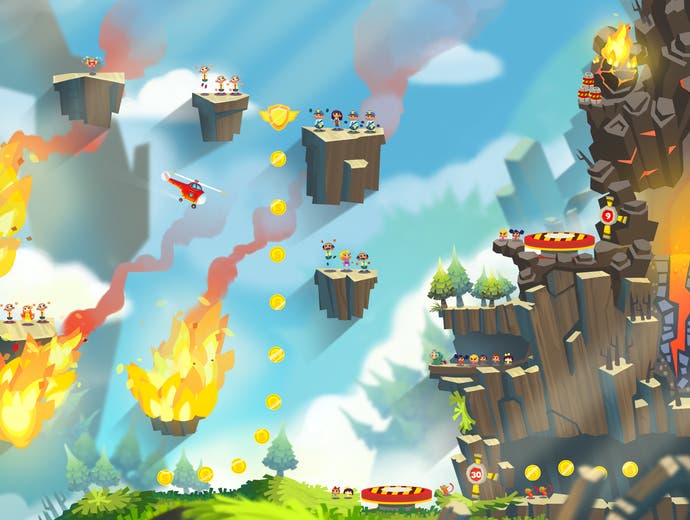
Forging a relationship with the player is precisely what Denki is doing on its current project, a delightful twitch arcade game called Save the Day, in which you pilot a helicopter around various disaster scenes, rescuing survivors and using gadgets to put things right. It's a "post-core" game, aimed at lapsed hardcore gamers who "no longer have the time in their lives" but have a more comfortable relationship with gaming culture than the casuals. Simple and accessible, with a heady undercurrent of old school skill, it's shaping up to be a real treat. The game was built for the Turbulenz browser game portal, and is using the Minecraft model of opening up the game to players even as development is ongoing.
"We have the advantage now that we can connect with the actual players as early as possible, and use that to drive how we take the game forwards. That's a nice situation to be in," says Sean. "The first version of Save the Day that we pushed out the other week, 50 per cent of the people who played it on the first day came back to play on the second, which is a signal that there's something here.
"We've been given permission by the people who play the game to do more with it, which is nice. At the end of the month it'll be completely open to everyone. It'll be completely live, completely naked development. We can open ourselves up to this and work with as many different people as we can. We just want people playing the game and enjoying it."
It seems the industry - and the gamers it serves - have finally caught up with the developer that shows no shame in billing itself as a "digital toy boutique". As long as it's fun, what's in a name?
"Toys are simply tools for play, simple as that," declares Gary. "Whether it's a toy car in the dinky Matchbox sets or a virtual toy car in the Gran Turismo 5 sense. It's a simplified, dramatised tool for play. You see this in all forms of culture, not just video games, where there are grown men and women and it feels like they're regressing but they're not. They're just indulging in what we used to call childlike stuff, and I guarantee that in the future we won't even regard play as a childlike pursuit. We'll take it as seriously as any other means of expression or escapism."
